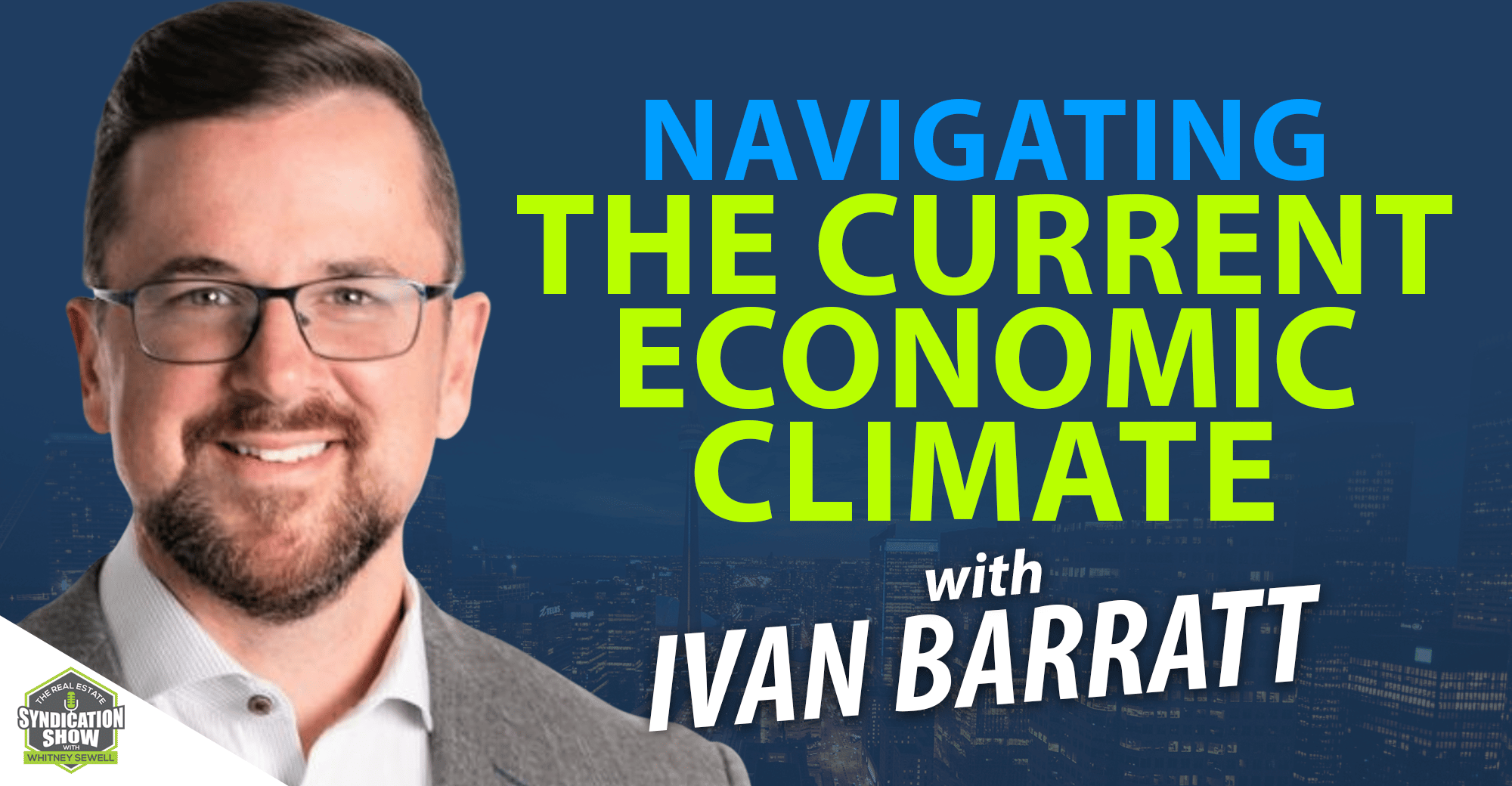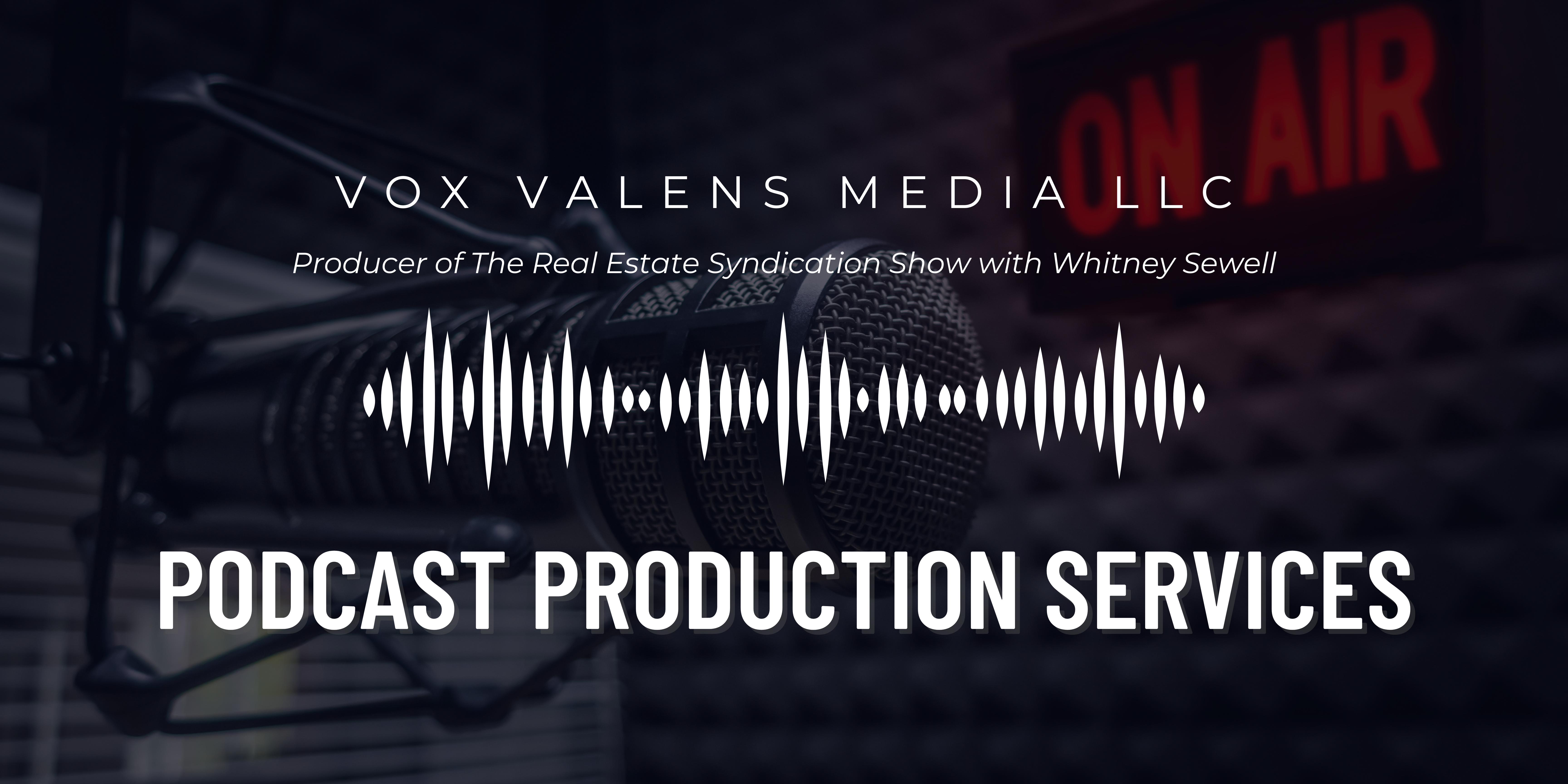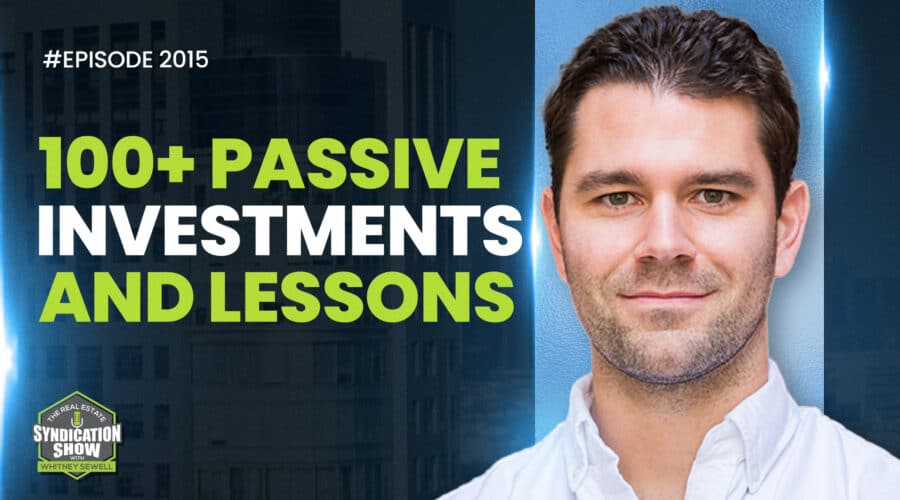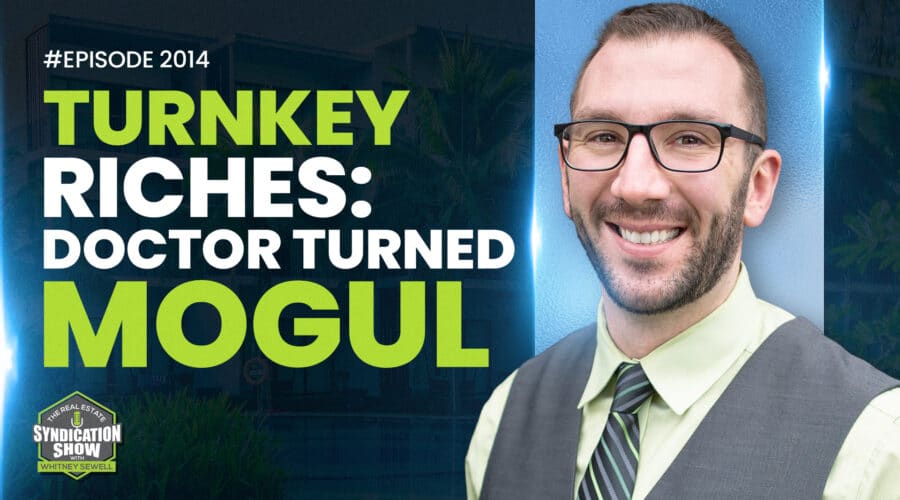Inflation is one of the major concerns now in many parts of the world. And in the U.S., the Federal Reserve raised rate hikes several times last year in hopes to address this. So, entrepreneurs, how can one navigate through this current economic climate which is affecting all industries?
Our Gracious Sponsor:
Vox Valens Media
The team that produces The Real Estate Syndication Show is now available to produce podcasts for you!
Visit https://voxvalensmedia.com/ to know more.
Watch the episode here:
Listen to the podcast here:
In the last part of our three-part series with Ivan Barratt of the BAM Companies, Ivan shares what he thinks will be the Fed’s next move, how it will affect the industry, the ways they manage risks, and why there’s the possibility of more opportunities to transact now. He also explains why he thinks it is a great time to trade in the paper for hard assets, particularly multifamily housing in the Midwest. Listen now!
Key Points From This Episode:
- Ivan says today’s inflation has come in cooler than expected.
- Ivan believes this is a great time to trade paper into hard assets.
- Why investing in multifamily housing in the Midwest is a good idea right now?
- Ivan shares he’s planning to go from four assets per year to up to ten.
- How does Ivan expect his current units to perform over the next six to 12 months?
- What has changed in the way that Ivan manages his assets?
- Ivan says continuous improvement is an advantage in the property management side of your real estate business.
- How many reserves should you have?
- What’s the most important metric that Ivan tracks personally and professionally?
- The number one thing that contributed to Ivan’s success is faith.
- How does Ivan like to give back?
Tweet This!
“From a macro long-term perspective, I think it’s an incredibly advantageous time to take paper money and trade it in for hard assets that generate income. And my favorite hard asset that generates income is multifamily housing.”
“I think I’ll be a net buyer as well, what that means is, I’ll be buying a lot more units than I will be selling.”
“By having the flexibility of floating shorter-term debt, with rate caps, and more cash on the side, those are my insurance I can be more nimble as to when I sell the asset.”
“We’re making sure that we got the best asset management team on the field or making sure that they’re looking over the shoulders of the property management side of the house.”
Links Mentioned:
WS1548: How to Start A Multifamily Business | Ivan Barratt
WS1549: Capital Raising During a Recession | Ivan Barratt
About Ivan Barratt
Ivan Barratt is a multifamily owner, manager, and syndicator specializing in large apartment communities in the Midwest. Since 2015, Ivan Barratt has raised nearly $250 million in equity, acquired over 5,900 units, and grown the BAM Companies to a best-in-class, four-time Inc. 5000 private equity and management firm.
Today, Ivan focuses on equity finance, acquisitions, and company strategy. Currently, his company manages nearly $700 million in syndicated assets.
Full Transcript
EPISODE 1550
[INTRODUCTION]
Ivan Barratt (IB): From a macro long-term perspective, I think it’s an incredibly advantageous time to take paper money and trade it in for hard assets that generate income. And my favorite hard asset that generates income is multifamily housing.
Whitney Sewell (WS): This is your daily Real Estate Syndication Show. I’m your host, Whitney Sewell. I’m so thankful you have decided to come back and listen again today and improve your business or your passive investing journey. Our guest today is an expert in this space. A good friend of mine who I respect in a big way is Ivan Barrett, a 20-year veteran in the real estate business. He’s raised over $250 million, he’s acquired over 6,000 units.
And today, you want his opinion about what’s going to happen over the next six to 12 months, right? I know you do, just as I do, as well, just somebody anyone like this that I respect in a great way in this industry, and just very experienced, I want to know what they’re expecting, right? How are they preparing? Are they buyers, are their sellers? You’re gonna hear that today from Ivan, just exactly what he is expecting, how they’re planning, what’s changed on how they’re operating, or has it changed?
And we’re also going to talk about reserves, as well. And what does that look like in the BAM companies. I want to remind you also, if you will go to iTunes, leave a written rating and review, send us a screenshot to [email protected]. I will send you a recommended book as a gift. I’m grateful for you, the listener, and grateful you are here with us again today, as we join with Ivan.
[INTERVIEW]
WS: Ivan, welcome back to the show honored to do numerous days with you.
IB: Good to be here. Happy to do a man having fun.
WS: I want the listeners now you need to go back and listen to the last two days. I haven’t talked through so many things about how he got started from his bedroom, starting his own management company to over 6,000 units purchased. It’s just an incredible story. Also, capital raising during a recession, some ways that have worked for him and you know, from starting to what they’re working on now. Just an incredible story as well.
But you know, Ivan started to allude yesterday, at the end a little bit about his thoughts on what to expect over the next six to 12 months, what’s this potential recession? Or the recession that we’re in, you know, going to look like? Is he buying? Is he selling? I just thought, hey, we’ll spend just a few minutes and talk just about that.
Ivan, let’s dive right in. I know the listeners would love to hear your thoughts on what to expect. And you know, how’s that changed what you’re doing? Or has it and let’s dive in.
IB: Absolutely. And feel free to cut me off if I ramble on too long since we’re short on time. But right now, as you and I are filming this in mid-December, you know, a couple of weeks before Christmas. And just today, inflation has come in cooler than expected, 10-year treasuries dropping again. I’m fairly certain we’ve seen a peak in rates. I think the Fed is going to raise again here, and then maybe pause after that,. It’s really hard to try and figure out exactly what’s going to happen in the short run.
But from a macro long-term perspective, I think it’s an incredibly advantageous time to take paper money and trade it in for hard assets that generate income. And my favorite hard asset that generates income is multifamily housing in the Midwest. Why? Well, people need a place to live. The Midwest is very stable, it’s still growing. Lots of good reasons behind that I won’t get into for reasons of time here.
And what’s happening right now is that there’s more opportunities to transact. So we’re buying assets from groups that are ready to take profit off the table, albeit less profit than they would have if they had sold earlier and 22. But they still made money from maybe building a project or they’ve executed their strategy. So they’re ready to sell, they’re ready to recycle that capital.
There’s also big funds out there, they’re having pain right now, Blackrock theory, making national news, they overpaid for everything in sight, because they had tens of billions of dollars that they had to put out. And unlike you and me, Whitney, they don’t have to worry about the individual investors in that track record quite as much as we do. And their pain is our gain.
So right now, we’re seeing some really incredible buying opportunities. For us a normal year, we might acquire four assets. I think in the next couple of years, we might acquire, you know, 6, 8, 10 assets in a given 12 month period. We’ll just have to see, it’s still time to be disciplined to use caution, and to be careful and make sure you’re buying something where you’ve got a real value add approach that can be executed, because that’s where the returns the bulk of the returns come from.
But there’s more of those out there right now because some fires have gone away, some big funds have gone away. And the same thing that happened to us in the early lockdown days at Covid when nobody was buying, you know, my partner and I raised our hand and said, “We’re buyers because I know I can bet on my management team. I know people are going to need a place to rent and so if I find markets that are still growing in good schools, great diverse jobs picture in a growing population, that I can execute my business plan.”
Late in ’21, ’22, when interest rates were at their lowest, and everybody could get money, and everybody was looking for deals, it was harder to find an asset. So for 2023, let’s see. For ’22, I’m definitely a net buyer for ’23, I think I’ll be a net buyer as well, what that means is, I’ll be buying a lot more units than I will be selling.
WS: Incredible. I’m grateful just for your outlook. I know the listeners are as well. How do you expect your current units to perform over the next six to 12 months?
IB: We still use a lot of floating rate debt. We use a lot of rate cap so we keep a lot of cash on the sidelines to be able to pay that higher interest in the short-term. Because although I could switch over to permanent debt, if I wanted to, that’s gonna lock me in to 5, 7, 10 years of term debt with hefty prepayment penalties, meaning I’m going to be paying that higher interest for a long period of time.
So by having the flexibility of floating shorter term debt, with rate caps, and more cash on the side, those that’s my insurance, I can be more nimble as to when when I sell the asset. So in the past, I’ve been a three and a half year hold period on average, to get that two and a half X return that we aim for. And I want to be able to stick close to that if I can. I wouldn’t be surprised if whole periods start increasing from three and a half to more like five years.
I’ve liked the optionality the way I’ve got my debt set up. And then you know, as a CEO, I get a great dashboard every week, that’s got a lot of different things on it. One of which is rent growth on these trade outs in my different funds. And so, we track those right now. We’re anywhere from 12 to I think, on the low end 8% rent growth.
Now that’s slowed down from 15, 16% rent growth. But it’s still quite a bit higher than the average for the markets I’m in. So one thing we do to help manage risk is we underwrite to the historical rent growth, right? So that we know if it returns to the norm, that we’re still going to hit our return objectives. And if we get higher rate growth, in that we’re going to do better than we originally originally told our investors, recession, I think we’re gonna see quite a bit of deflation coming up, you know, this, this pendulum that’s been swinging so hard, and all sorts of things.
Prices, rent growth, demand, availability of goods, you know, that’s a pendulum that got hit pretty hard is swinging pretty hard, thanks to Covid. Eventually, that’ll normalize and the pendulum slows down. And it’s not quite as wild, the rest stealin for some wild swings and a lot more of the market. It’s betting the bond market, which is I don’t know, if you remember, maybe 10 times bigger than the stock market is already indicating that the Fed is over tightened in the bond market usually gets long-term, macro economic changes correct. The bond markets already saying we’ve seen a peak in rates, so we’re going to come down from here.
WS: Has it changed your operations moving forward, you know, like over the next six months, are y’all doing anything different than you were a year ago as far as just the way you’re managing your assets?
IB: Oh, gosh. If I asked my team to put together a brief of all the things we’re doing differently than we were doing a year ago, it’d be a long one.
WS: Okay. Well, we’re not changing anything, you know. And I just wonder —
IB: Well, watch every year, the market and how we look at deals changes. You know, over the past several years, the vintages of assets we’ve been buying have been newer and newer. Last several assets we’ve been buying are more institutional grade off the original developer. But we’re buying assets where we can burn off their leasing concessions, we can operate it more nimbly more lean than they did. You know, they’re great builders, but maybe not the leanest of operators, right? Their profit comes from building not from operating, that could change next year. Right?
It’s kind of like a, you know, the football announcers in the game saying, hey, the team can play the game, they’re being given, right? And they’re gonna win this football game, you got to play the market, you’re going to be giving. And so the market is always changing. You’ve got to adapt with it.
On the property management side, it’s more about just continuous improvement. And yeah, it’s been it’s been quite easy the last few years to get great deals and get great returns now is where the rubber meets the road. And it’s going to be a factor harder to get those returns. And that’s where the operations side of it really has to shine.
So we’re making sure that we got the best asset management team on the field or making sure that they’re looking over the shoulders of the property management side of the house. Just made a big hire. We brought in one of the most well known veterans of maintenance in the Midwest. We brought him in to run our maintenance training program because we want our maintenance team to be the best on the field as well.
So we’re making those investments. Like we talked about an episode, maybe the first day, right is putting that great team on the field that looks like the team that is going to deliver the company that you want to have. I want to have a year from now two years from now and out into the future.
WS: Yeah. Wow. So many things we could go into, Ivan, is bringing management in house this past year as well. You know, there’s so many things going around that I’d love to talk to you.
IB: You’re doing the right thing, man. You’redoing the right thing. It’s not gonna be easy, but it’s gonna pay off.
WS: Yeah, definitely the easier route. However, if we just stayed on the road we were out at that, we probably would have been worse. So —
IB: You can control the whole chessboard and every piece on it. And you can take your best leasing agent from this property. It’s doing great now and you can move them over to another property and you can work that board and every penny on that line item. You’re looking at it, you train your team to look at it as an owner would, we train our maintenance techs on cash flow. Nobody trains them on that.
These guys come like nobody’s ever told me about how this affects the budget. And you know how this affects cash flow. We train our people on that so that maybe they’re not looking at as like I would, but they’re looking at a little bit better than a third-party team would.
WS: Right. One quick question. Before we move to a few final questions. Just in the last few minutes that we have. Reserves. I get this question often about how do we look at reserves? How much reserves should we have?
IB: Across the funds, I right now, in probably somewhere between two and three times cash in reserve than the bank mandates. I’ve got millions in cash and the funds that I’m not distributing to investors. Now we show them how much cash is sitting there. So they kind of get an idea of what their investments worth and the fair market value and the cash on hand.
But we separated.. We’ve got a shares, they get cash every month, right? They don’t have any upside from there. The B shares were very upfront as to “Hey, listen, this is no cashflow. But more upside on the back end because there’s now fewer B shares because the A shares coming in.” I don’t wanna go down too far that rabbit hole. But for the majority of our investors that don’t care about cash flow, we’re keeping their cash in the bank, only the A shares are getting their distributions.
WS: So I get the question often about like, should I have three months, six months, 12 months of operating expenses and debt service in the bank? Or how do you see that? Or do you think about it like that?
IB: I’d have to phone a friend. I’d have to call my asset management team and my partner are the best real estate operators in the country. I certainly don’t can’t take the credit for what he does. But I know right now that we’re somewhere between two and three times what the bank mandates we should have in reserves. Understanding cash.
WS: Good for you. I love that. I love that. I’m so big on man. We need ample reserves without catching crap. You know.
IB: Don’t hate me, but I call it the when shit happens pile.
WS: Yeah. Yeah, that’s right. Quickly, most important metrics that you track, it could be personally or professionally.
IB: Oh, man. This is why you should send me these questions ahead of time Whitney, you got me stumped there. Personally, it’s a little more ambiguous but trying to get in one-on-one time, date nights with my wife. One-on-one time with the kids. Trying to keep track how much time I’m spending with them. That’s a big one. I try to work out pretty much every day.
On the professional side, right now, I’m watching rent growth and get covered are my two big ones. And then I’m watching some of those other key metrics on a monthly basis, trailing NOI, occupancy, debt collection, those kinds of things.
WS: What’s the number one thing that’s contributed to your success?
IB: I didn’t think this would pop into my mind. You know, normally I say this question. It’s not one thing. It’s a bunch of little things done well with discipline every day. But if I didn’t have faith in what I can’t see today, right, if I didn’t have faith, I wouldn’t be here, man. Because a lot of this takes stepping forward in faith, especially when you start your own company. It can be scary.
WS: Yeah, no doubt.
IB: You have to tell me some time how you did both at the same time with the job and in business and all that I couldn’t help there.
WS: How do you like to give back?
IB: What we started doing a long time ago was we just we started saying, “Okay, we’re gonna do this percent every year, we’re gonna give back and then next year, we’re gonna raise it a percent the year after that, we’re gonna raise it a percent.” And so, that’s helped us incrementally give back more. And then I try to find great people, like you know what you’re doing on the adoption side, we give to our church. We’d like to try to get our kids involved. Best thing we did for our kids, we’ve gone on a couple of home bills, get them out of their bubble.
You know, they’re living pretty good here in the Midwest, trying to get him out of that bubble and show them how the rest of the world lives give them perspective. So I’m trying to be better given more time. It’s easy sometimes to get the treasure, when there’s a lot of it to give up. My wife, we’re the first one to tell you like, kids need to see me giving back. We need to be actually in it, doing things and then we’ve always got something set aside for somebody just pulls on our heart or something happens to somebody’s family, something like that. We’ve always got a bucket set aside for those those in the moments where we feel that tap on the on the spiritual shoulder.
WS: That’s incredible. I appreciate you even bringing up bringing the kids into that as well. It’s something we’re working really hard on that to, like, have no idea how great they have. Man, you know, most of the world do not live like this, even like from serving at some local soup kitchens or delivering food and you know, it’s got us in different parts of the community by doing that, that they would typically never get to say, right?
IB: We got a lot more of that to do. So we raised some kids that are chasing after God and helping make this place a little better than they found it.
WS: Ivan, I can’t thank you enough for your time and being willing to spend so much of your valuable time with us. Man, it’s so great to catch up with you, always enjoy it. One of my favorite people in the business to say the least so grateful to have you. Tell the listeners again though how they can get in touch with you.
IB: Well first right back at you, man. I could do this all day with you. I know you got a hard stop too. But I just really enjoyed this and hope I delivered some value to your audience. Maybe just helped one entrepreneur get a little bit closer to their goals. Pretty easy to find, Google my name down here. Ivan B-A-R-R-A-T-T, the BAM Companies or BAM Capital. 317-762-2625, 317-762-2625. Merry, Merry Christmas Whitney. Thank you for having me.
[END OF INTERVIEW]
[OUTRO]
Whitney Sewell: Thank you for being with us again today. I hope that you have learned a lot from the show. Don’t forget to like and subscribe. I hope you’re telling your friends about Real Estate Syndication Show and how they can also build wealth in real estate. You can also go to LifeBridgeCapital.com and start investing today.
[END]
Love the show? Subscribe, rate, review, and share!
Join the Real Estate Syndication Show Community:






